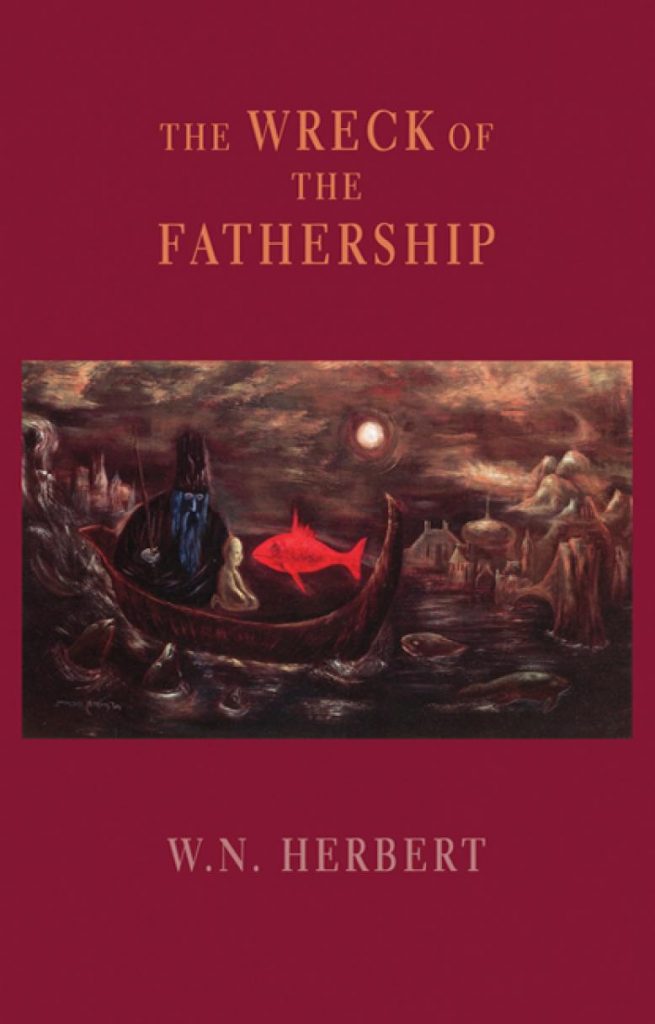The Wreck of the Fathership
W.N. Herbert
(Bloodaxe Books, 2020); pbk: £12.99
The Wreck of the Fathership is the seventh poetry collection from W.N. Herbert. Herbert was Dundee’s inaugural Makar from 2013-2018. This collection has its roots firmly in Dundee, but calls upon themes, techniques and artists the world over, and overflows with hidden meanings and metaphysics. Herbert’s Fathership is an outpouring of emotion, especially of grief that threatens to drown the reader but steered by such poetic genius that no such disaster occurs. The turbulent contents are handled tightly, deftly.
How to introduce such a work? Let us begin as the collection does, with ‘Fathership Glosa’. Following the Spanish poetic form, Herbert makes an epigraph of his father’s twenty years-premature ‘jisei’ or death poem. The entire collection is dedicated to Bill Herbert Sr., and it is his absence that drives this poetic tour de force:
I had to come
I had no say
I was not here
I could not stay
Herbert was staying in Broughty Ferry at the time of his father’s death, in a room with a view of the Tay. Herbert’s relationship with the river becomes fraught and ambivalent, as the former Makar ties his own trauma to that of Dundee. Bill Sr., was a naval merchant, and in the wake of his death The Tay becomes the underworld. The underside of the river becomes a gateway to the past, a city of the dead. Its denizens include the souls of the 1879 Tay Bridge Disaster and all hands aboard the lifeboat Mona, which sank in 1952. Meanwhile dolphins, ‘gairfish’ in Dundonian Scots, leap between these two worlds to Herbert’s envy in ‘June Dolphin’:
Eternity’s aneath us,
it’s millt upon thi beach –
we kenna hoo sic ithers keeth us,
nor intae whit we breach.
The Tay is not the only underworld Herbert explores. The removal of Herbert Sr’s tumour is referred to as a ‘katabasis’, an Ancient Greek term for a descent, for example into the underworld, and in poetry a delving or deepening. From here, Herbert proceeds to introduce some of the cultures and traditions he will be drawing on throughout the collection, namely moving us from Ireland (the place of the surgery) to Greece to Japan to Dundee:
Mr O’Malley of the Mater
made katabasis of your entrails,
stitched you on time with sure sutures.
That your labyrinth’s core might be your tomb
turned you half-Kirkton minotaur,
half-samurai somehow Dundee-born[.] (‘Fathership Glosa’)
On top of this, ‘katabasis’ is also a term in modern psychology for depression in young men. In this way, Herbert’s writing explores the semantic possibilities of words.
‘Glosa’ utilises both Spanish and Japanese poetic forms, and the collection honours Herbert Snr’s legacy as a traveller by celebrating art, culture and religion from around the world, and condemning intolerance in modern politics. At the same time Herbert also explores his and his father’s ties to Dundee, portraying it through history, metaphor and truth, writing in a mix of English and Scots, and even at times inhabiting the spirit of William McGonagall.
A self-awareness and wit permeate much of Herbert’s Fathership, buoying the reader up from the weighty themes of grief or deep metaphysical introspections. There are conversations between The Beatles and Jesus. In ‘To A Ploughman’, Burns’ mouse rebukes the poet. In ‘Three Flies’, between references to Paradise Lost, the Mona lifeboat and General Monck, the poet winks at the reader as one ‘fleh’ remarks: ‘This somehow seems symbolic…’
Herbert calls himself ‘no engineer’, but this collection is an intricately interwoven mechanism. The themes carried throughout rise and fall, journeying back and forth constantly to one another, are arrested and interrogated for a time in the doldrums. But when they come to port finally in Broughty Ferry, the catharsis is overpowering.
Kai Durkin


Leave a Reply